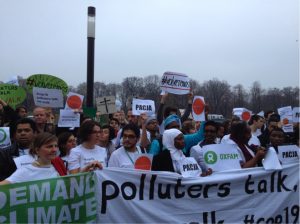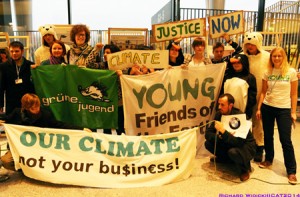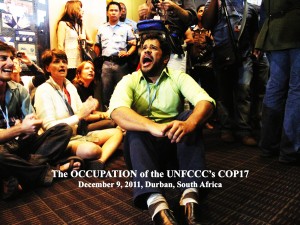John Foran: Research Archive
John Foran (IICAT:8/26/2020)
I am a scholar-activist of and with the global climate justice movement. I am no longer interested in publishing purely scholarly analyses for small audiences of expert readers, but rather in producing and disseminating as much useful knowledge and as many fresh ideas as free (in the sense of at no cost) as possible for the widest possible audience.
In this regard, please see John Foran, publications 2016 through August 2020 (PDF with live links), and my Curricula Vitae
For me, climate action and theory mean knowledge for deep, transformational social change.
These ideas, actions, and movements often come from the majority world of the global South, and from women, indigenous people, youth, farmers, fisherfolk, workers, artists, singers, writers, and thinkers everywhere. And so this website will bring you some of the voices we have heard in the course of our work in support of the global climate justice movement.
IICAT is also a home and “library” for scholars, activists, and all of civil society, where we can share an exchange of ideas and a building of networks of movements for radical social change in defense of nature and of humanity, of the planet and everything on it, and try to envision the kind of futures we want to replace the current trajectory.
For my part, I want our IICAT to provide a space for a collective exploration of climate action and theory in the above senses. And so, I want to know what sorts of things do people interested in climate action and theory want to see on the web? What sorts of ideas, texts, and other creations would you associate with climate action and theory? What websites already exist in the broadly defined area of climate action and theory?
Please write directly to me at jforan5@gmail.com to share your ideas and to make connections for climate justice work!
ARTICLES, ESSAYS & ILLUSTRATED BLOG POSTS
2010 – 2017
by John Foran
“The Twelve Days (and Months) of Climate Justice Day Four: What Will It Take to Win?” with Bill McKibben and Ezra Silk (January 2, 2017)
“The Twelve Days (and Months) of Climate Justice Day Three: Is it Possible to Actually Live Well?” with Pablo Solón (December 30, 2016)
“The Twelve Days (and Months) of Climate Justice Day Two: Winona Laduke and Sitting Bull at Standing Rock,” with Winona LaDuke (December 29, 2016)
“The Twelve Days (and Months) of Climate Justice Day One: Climate Justice is the Power of the People,” with Bill McKibben (December 28, 2016)
“Make Connections, Make Food” (December 15, 2016)
“COP22: Can we UNF*CK the UNFCCC?” (November 29, 2016)
“The Day After: “Just Go For It, Only More So” (November 15, 2016)
“Introducing … The Nearly Carbon-Free Academic Conference: The World in 2050” (October 25, 2016),
“Finding Our Frontlines in North Dakota: The Climate Justice Movement is Standing Up.” Earth News: More than News of the World (September-October 2016)
“Earth News: More than News of the World – Let’s Think in Terms of the Next One Hundred Months” (August 17, 2016)
“Indigenous Truth Rising: A Journey for Climate Justice” (August 11, 2016)
“Clean Energy/Revolution in Philadelphia: A Photo Essay” (August 5, 2016)
“The Power of Indigenous Activists at the Summit of the Climate Justice Movement” (August 2, 2016),
“Earth News: More than News of the World” (July 1, 2016),
“A Few Thoughts on Studying the Most Radical Social Movement of the Twenty-first Century” (March 13, 2016),
“The First Draft of History: An Annotated Guide to Thirty-Four of the Best Pieces on the Paris Agreement at COP 21” (January 4, 2016)
“The First Draft of History Thirty-Four of the Best Pieces on the Paris Agreement at COP 21.” PDF. (January 4, 2016)
“To Change Everything, it’s Going to Take Everything We’ve Got” (January 4, 2016)
“The Paris Agreement: Paper Heroes Widen the Climate Justice Gap” (December 13, 2015),
“The World is Broken and the Hypocrisy of COP 21 Isn’t Going to Put it Back Together” (December 9, 2015),
“Climate Talks at the 1.5 Degree Crossroads” (December 9, 2015)
“COP 21, Round One: Battle Lines Are Drawn,” A Report on the Global Climate March and the Opening of the Paris COP 21 Negotiations (December 3, 2015)
“The Insanity of the COP: We Must Adopt a Different Vision” (December 8, 2015)
“Ambition and Smoke, Love and Courage: What to Expect from the Climate Treaty Negotiations in Paris” (November 30, 2015)
“A History of the Climate Negotiations in Six Videos” (November 10, 2015)
“Just Say ‘No’ to the Paris COP: A Possible Way to Win Something for Climate Justice” (September 16, 2015)
“Re-Imagining Climate Justice at the COP: Finding Our Frontlines at a Gathering in Bellagio, Italy” (August 2015)
“Dear Governor Brown…” (Photo essay, February 8, 2015)
“2015: Year Zero for Climate Justice” (January 1, 2015)
“Never Trust a COP: The 2014 UN Climate Summit, Lima, Peru” (December 14, 2014)
“The Dirty, Dirty Math of Measure P” (November 5, 2014)
“Reflections on Naomi Klein’s ‘This Changes Everything’” (November 30, 2014)
“John’s Journey on the Climate Train to the New York City People’s Climate March” (September 2014)
“What Now for Climate Justice? Re-Imagining Radical Climate Justice.” December 2014. Pp. 20-38 in What Now for Climate Justice: Social Movement Strategies for the Struggle over the Next Universal Climate Treaty. Volume co-edited with Richard Widick. 2014
“Climate Injustice: The Real History of the Maldives.” With Summer Gray. Pp. 14-23 in Berkeley Journal of Sociology. Volume 59. 2015. First published on-line in September 2014
“‘Get it Done!’ The Global Climate Justice Movement and the Fateful Race for a Radical Climate Treaty.” Pp. 34-42 in Global Undertones. Volume 1. Summer 2014
“¡Volveremos!/We Will Return:” The State of Play for the Global Climate Justice Movement at the 2013 Warsaw UN Climate Summit COP19.” Pp. 454-477 in Interface: A Journal for and about Social Movements. Volume 6. Number 1. May 2014
“Beyond Insurgency to Radical Social Change: The New Situation.” Pp. 5-25 in Studies in Social Justice. Volume 8. Issue 1. 2014
John Foran and Summer Gray. “At the Crossroads: Another Maldives is Possible.” Truthout. September 17, 2013, and at dhivehisitee.com
John Foran and Summer Gray. “240,000 letters: Mohamed Nasheed’s Campaign to Restore Democracy to the Maldives.” Dhivehi Site. September 26, 2013, Published as “Mohamed Nasheed’s Campaign to Restore Democracy to the Maldives.” Counterpunch. September 27-29
John Foran and Summer Gray. “A Fight Like Many Others: What Happens in the Maldives Elections on October 19 Concerns Us All.” Counterpunch. October 18-20, 2013, Published in the Maldives, October 18, 2013
RESEARCH
John Foran 2016. “Reimagining Radical Climate Justice.”
John Foran 2014. “‘Get it Done!’ The Global Climate Justice Movement’s Struggle to Achieve a Radical Climate Treaty.”

John Foran 2014. “¡Volveremos!/We Will Return”: The State of Play for the Global Climate Justice Movement”
John Foran and Richard Widick 2013. “Breaking Barriers to Climate Justice”, Contexts, the Public Sociology Journal of the American Sociological Association.
This article analyzes the outcomes of the 2011 COP17 in Durban, South Africa, deconstructing both the triumphalist official narrative of “Saving Tomorrow, Today,” and the judgment of movement leaders that the outcome was tantamount to genocide and planetary ecocide. As we see it, any hope for progress through the UN liesin emergent global civil society and the possibility that its youth, indigenous, labor, and environmental movements will keep on converging at the climate talks, keep on supporting the countries whose positions best address the magnitude of the climate crisis, and keep on growing to become the greatest social movement the world has ever seen – a truly diverse global climate justice movement of movements
John Foran 2012. “Let Us Change the World Without Taking Power Violently,” Journal of Classical Sociology
Written in the form of a letter to a comrade, this text presents a political balance sheet on the work of John Holloway on radical social change. The strength of his work lies in its acute insight into the psychology of subjects resisting capitalism, the expansion of the concept of political agency to embrace myriad forms of everyday “breaks” from capitalism’s systemic grip, and the poetic prose that graces Holloway’s major works, Change the World without Taking Power and Crack Capitalism.
Points of critique include the difficulty and thus limited utility of the arguments that provide the foundation for these insights, the constraints posed by staying within the theoretical universe of Marxism, and the determined refusal of all forms of engagement with the state. The author argues that the forms taken by radical social change in the twenty-first century are more varied than Holloway’s major works suggest, and that, in particular, nonviolent social movements such as Latin America’s Pink Tide and the Arab Spring help us imagine multiple paths to radical social change today.
John Foran 2012. Taking Power or Re-Making Power? The Not-so-New yet Never Seen Cultures of Resistance Today. This is work in progress on the political cultures of the new movements for radical social change…
John Foran 2011. Climate Justice Movements — A Work in Progress. iicat.org.
John Foran and Richard Widick, 2011. “Earth in Crisis: A Forward-Looking Agenda for Research on the Cultural Causes and Consequences of Climate Change 2010-2020 and Beyond”, or download from National Science Foundation, nsf.gov. Also published here at iicat.org.
A catastrophic collision of human beings and the natural world seems well underway, in a new century characterized by problems of climate change, food insecurity, water shortages, resource wars, economic instability, climate refugees, global pandemics, and deteriorating governance. Climate change aggravates all of these and confirms their global interrelatedness.
The Foundation should respond by funding research on the underlying causes and consequences of climate change in a two-pronged program aimed at understanding 1) the changing cultural/institutional engines of economic accumulation and its negative social and environmental externalities, and 2) responses from civil society, especially the social movements and forum politics of climate change activism, with focus on the origins, developmental trajectory, animating visions, tactics/strategies, and growth or decline of these movements. Conceptual tools for understanding the complex interactions among social movements, civil societies, national governments, and global bodies include the notions of “modern social imaginaries” (Widick) and “political cultures of opposition and resistance” (Foran).
Studying the cultural causes of climate change and the institutional forces behind resistance to future-oriented climate reform are crucial starting points for this research, which could with NSF guidance contribute much to an understanding of climate change movements, and indirectly toward economic, social, and ecological sustainability.
John Foran 2010. “Manifesto for Radical Social Change,” iicat.org.
This is a manifesto – a deliberately provocative and evocative text – designed to call on scholars of globalization to focus our work more directly on the study of the ongoing global crisis (which is seen far into the future) rather than on the specialized academic niches our work generally occupies. This is the move from (at best) a “critical globalization studies” to a “global crisis studies.” Secondly, it urges global studies scholars, even those already engaged in public sociology or public intellectual work, to push further into making our work relevant and accessible to wider publics well beyond the university and journal publishing systems. And finally, it advocates moving beyond even a “public sociology” directly to “global justice work” in a call to arms to academics and intellectuals to engage ourselves in global social justice action in any way of which we are capable. The text offers a reading of the global crisis as an organic set of interlinked crises, uses literary-like short case study sketches to make its points, provides a succinct thesis about how radical social change is successfully made, and includes a set of resources for scholar-activists.
John Foran 2005. Taking Power: On the Origins of Third World Revolutions (Cambridge University Press).
John Foran 1992. Fragile Resistance: Social Transformation in Iran from 1500 to the Revolution (Westview Press).
TEACHING FOR CHANGE
Here is some of what I do for a living. These are the most recent syllabi to the several undergraduate (100-level) and graduate (220-level) courses that I teach at the University of California, Santa Barbara.
URLs of many of the writings referred to can be cut and pasted into your browser to view online…
I consider teaching a radical act… and don’t forget that the Latin root of the word “radical” actually means “going to the root”!
Learning and teaching are complex, endlessly fascinating collaborations. I learn enormous amounts from the students in my classes, whom I consider companions on an intellectual, potentially life-changing journey. My goals for my classes and myself include honing our critical thinking skills, improving on the ways we write and speak, acquiring the ability to work collaboratively, learning the art of applying theoretical concepts to actual historical and contemporary situations, and making connections between what we study and how we live.
In the course of more than twenty years of university teaching, I have come to value interaction, participation, and exchange – discussion in its many forms – as the best way to teach and learn. So we teach and learn from each other.
We do this through a variety of learning approaches, including discussions of many kinds, student-led presentations, mini-lectures, incredible guest speakers, a novel,
I ask everyone to do a lot of reading, thinking, discussing, and writing; my pledge is that engagement with these materials should prove a rewarding – and, who knows? – quite possibly, a life-changing experience.
|
|


